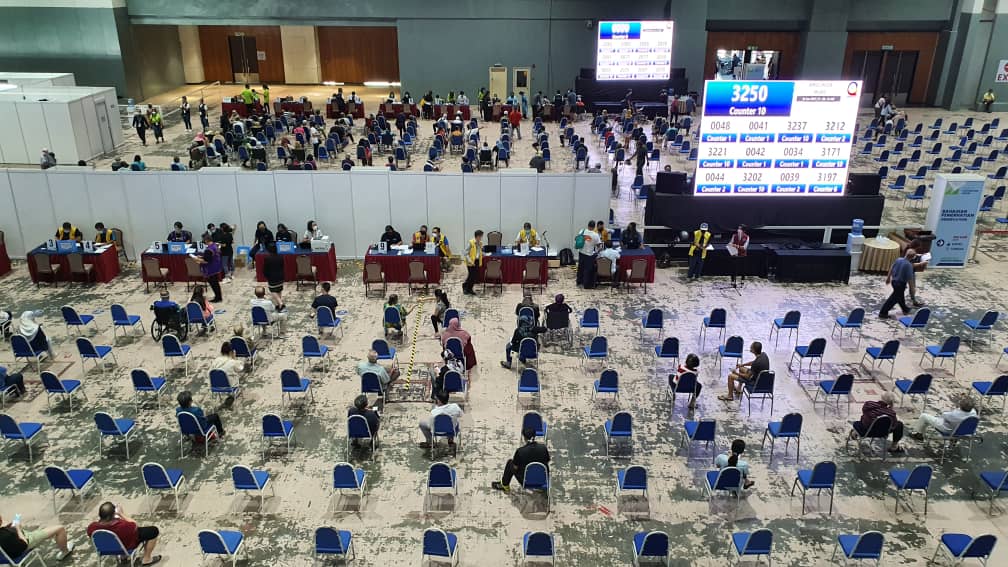KUALA LUMPUR, Jan 13 – A study published in the New England Journal of Medicine (NEJM) last November found that Pfizer-BioNTech’s Covid-19 vaccine is safe and effective against coronavirus for children five to 11 years of age.
The study, supported by Pfizer and BioNTech, involved three phases of clinical trials, where the first phase is an open-label, dose-finding study and phase two and three trials were randomised trials among children 5 to 11 years of age.
The Phase One trial from March 24 through April 14, 2021, involved a total of 48 recipients who were divided into three groups — one receiving two Pfizer Covid-19 vaccine doses at 10-micrograms (mcg), another at 20mcg, and the other at 30mcg.
The trial found that most local reactions were mild to moderate, and all were temporary. Fever was more common in the 30mcg dose-level group than in the 10mcg and 20mcg dose-level groups after the first and second doses.
Adverse events from the first dose through one month after the second dose were reported by 43.8 per cent of participants who received two 10mcg doses of the Pfizer Covid-19 vaccine, 31.3 per cent of those who received two 20mcg doses, and 50 per cent of those who received two 30mcg doses.
One severe adverse event (grade 3 pyrexia or fever) in a 10-year-old participant began the day of the second 20mcg dose, with their temperature reaching 39.7°C the day after vaccination and resolving the following day. Antipyretic medications were used, and the investigator considered the event to be related to receipt of the Pfizer Covid-19 vaccine.
The Phase Two and Three trials from June 7 through June 19, 2021, involved a sample size of 2,268 participants across 81 sites in the United States, Spain, Finland, and Poland. A total of 1,517 were randomly assigned to receive the Pfizer Covid-19 vaccine and 751 received placebo.
Overall, 52 per cent were male, 79 per cent were White, 6 per cent were Black, 6 per cent were Asian, and 21 per cent were Hispanic or Latinx. The mean age was 8.2 years, with 20 per cent having coexisting conditions, including 12 per cent with obesity and approximately 8 per cent with asthma, and 9 per cent were Covid-positive at baseline.
The study showed that two 10mcg doses of the Pfizer Covid-19 vaccine administered 21 days apart were safe, immunogenic (able to produce an immune response), and 90.7 per cent effective against Covid-19 in five-to-11-year-old children.
It noted that five-to-11-year-olds reported higher incidence of injection-site redness of 15 to 19 per cent compared to adults and adolescents at five to seven per cent, as well as swelling (10 to 15 per cent, versus 5 to 8 per cent).
However, kids under-12 reported a generally lower incidence of systemic events, including fever (3 to 7 per cent, versus 1 to 20 per cent) and chills (5 to 10 per cent, versus 6 to 42 per cent).
Lymphadenopathy (enlargement of lymph nodes) was reported in 0.9 per cent of 5-to-11-year-old Pfizer recipients, an incidence similar to that in 12-to-15-year-olds (0.8 per cent) but higher than that observed in adults (0.3 per cent).
Four potentially vaccine-related rashes were reported, too few to determine whether the pattern was similar to that observed in adult Pfizer recipients, the report stated.
No multisystem inflammatory syndrome in children (MIS-C) cases – a rare Covid-linked syndrome which causes inflammation throughout the body – were reported, although surveillance continues.
Neither myocarditis or pericarditis was observed, a finding consistent with the low frequency of adverse events with real-world use of Pfizer in other age groups, the study found.
Myocarditis is inflammation of the heart muscle, and pericarditis is inflammation of the outer lining of the heart. In both cases, the body’s immune system causes inflammation in response to an infection or some other trigger, according to the US Centers for Disease Control and Prevention (CDC).
“The robust virus-neutralising response observed in 5-to-11-year-olds was similar to that seen in 16-to-25-year-olds from the pivotal trial, which demonstrated 95 per cent vaccine efficacy among persons at least 16 years of age from seven days to approximately two months after the second dose,” the authors of the study said.
The US Food and Drug Administration (FDA) authorised on October 29 last year the emergency use of Pfizer’s Covid-19 vaccine for children aged five to 11 years.
The Pfizer shot was approved in America as a two-dose primary series, three weeks apart, but at a lower dose (10 mcgs) for children, than the 30 mcgs used for those aged 12 years and older.
Malaysia’s Drug Control Authority (DCA), under the National Pharmaceutical Regulatory Agency (NPRA), on January 6 last week granted conditional approval for 10mcg dosage of Pfizer’s vaccine for children aged five to 11.
Health Minister Khairy Jamaluddin said details on the rollout of the children’s Covid-19 vaccination programme will be announced soon after discussions with Pfizer on the latter’s vaccine delivery schedule.








